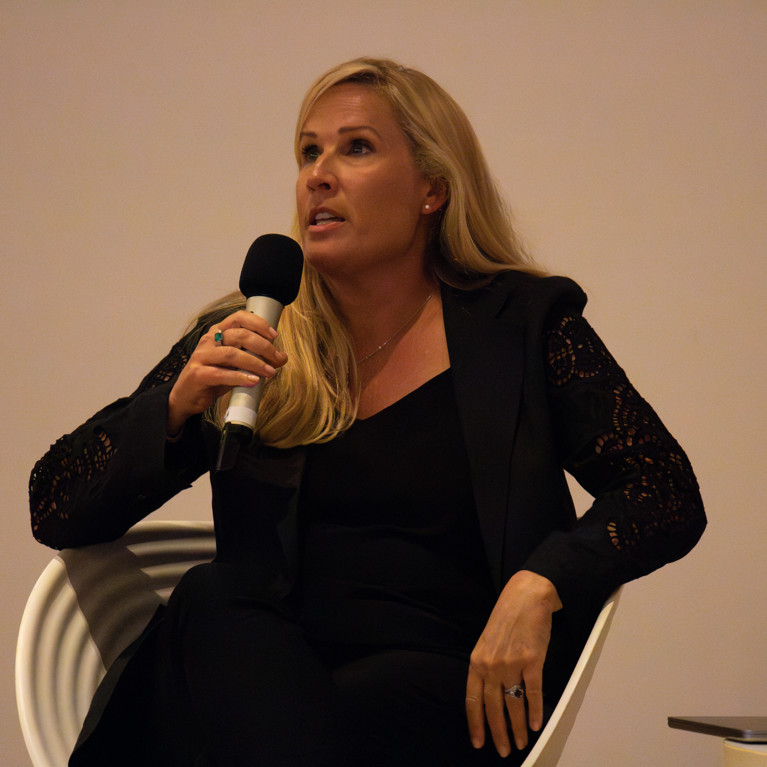- Posted on 9 Jul 2025
The enduring power of national myths to shape political rhetoric and threaten democratic stability formed the basis of a compelling address by acclaimed author and academic Professor Sarah Churchwell at the 2025 UTS Vice-Chancellor's Democracy Forum.
The talk, which was followed by a panel discussion with UTS Emeritus Professor and Special Innovation Advisor, Roy Green AM and acclaimed author and UTS Luminary Anna Funder, drew a packed audience to explore how national myths influence democratic values, power, and public memory.
Not just stories
Guest speaker Professor Churchwell, Chair of Public Humanities at the University of London, began by emphasising how cultural narratives are fundamental to understanding political influence.
“Politics are downstream of culture”, she said, highlighting that “America is a cultural idea” distinct from its geopolitical form.
These myths, she said, are far from benign: “Myths are not just stories, they are frameworks for distributing and justifying power – they shape memory and political imagination.”
A case study in mythmaking and power
To illustrate how foundational myths embed themselves and justify power structures, Churchwell dissected Margaret Mitchell's Gone with the Wind.
She described it as “one of the most influential pieces of white supremacist propaganda in American popular history,” arguing it reframes the Civil War as a tragedy “not because it was fought to preserve racialised slavery, but because it disrupted a supposedly noble and innocent way of life.”
Churchwell detailed how the novel "sanctifies the reimposition of white dominance as a moral redemption,” champions “blood and soil nationalism,” and portrays the Ku Klux Klan “as a moral necessity.”
The book, she said, “captures the origin myth of white grievance in America, the idea that white people are victimised by racial justice.”
From “manocracy” to the “manosphere”
Churchwell traced a lineage of often-overlooked homegrown American authoritarian tendencies, citing a 1933 proposal from Khaki Shirts leader for an armed march on Washington to install an “authoritarian regime he called manocracy, rule by strong men.”
This historical “fantasy of male domination,” Churchwell observed, finds a disturbing modern parallel, it “has returned in the digital age today's manosphere – online influencers, forums, podcasts – echoes the same language: domination without accountability, wealth without responsibility, rule without consent.”
These historical patterns, alongside co-opted slogans like “America First” and a distorted “American Dream,” pave the way for contemporary anti-democratic currents.
These tendencies, Churchwell said, culminate in present-day ideologies such as the “Dark Enlightenment,” which she described as “a reactionary movement rooted in contempt for democracy and open society.”
Proponents of this view, she explained, believe “Democracy isn’t just flawed, it’s a mistake... illegitimate,” and instead “propose rule by the few CEOs, technocrats, strong men: their ideal society is corporate.”
It wants to replace inquiry with obedience, evidence with ideology and public education with private control. It fears universities and libraries precisely because they house public memory.
Professor Churchwell concluded her keynote by championing the humanities as essential tools for “public reasoning, for truth without obedience, for memory without myth.”
Their value, she argued, lies “not in moral purity, but in their insistence that truth and imagination are public acts.” The struggle for democracy, she said, “is a struggle that will never end, and it's a struggle that will always be worth the fight.”
Billionaire influence and institutional fragility
The ensuing discussion with Green and Funder, further explored the nexus of myth, power, and democratic vulnerability.
Professor Green highlighted the apparent paradox of the “billionaire class” supporting populist movements whose interests seem divergent, asking when their supporters might see the contradiction.
Churchwell acknowledged the power of “cognitive dissonance” and “wilful blindness,” fearing that by the time such realisation dawns, “they'll either tell themselves it's fine, or it will be too late.”
Green also pointed to the systematic attacks on universities, with prominent conservative activist Christopher Rufo saying he wants the Trump administration to put them in “a state of existential terror.”
Churchwell urged institutions to resist, noting that "even if you capitulate, they keep grabbing stuff from you.”
Funder questioned if the “Dark Enlightenment” could “effectively usher in a dark age,” given its assault on repositories of knowledge. Churchwell noted the historical term “dark ages” referred to a lack of evidence, warning, “are we headed towards the Dark Ages? Yes, because they're trying to destroy the evidence.”

Funder also connected these trends to gender politics, citing the misogynistic views of figures like Elon Musk and Thiel, and Trump administration efforts to eliminate mentions of women from official websites, asking how this “broligarchy” played out.
Churchwell said that such movements are frequently “patriarchal for a reason,” idealising a past where “men like them were in charge” and framing societal progress for others as “decadent decline.”
A call for vigilance
UTS Vice-Chancellor Andrew Parfitt, in his opening remarks said, “one of the roles universities have in our communities is to allow contentious ideas to be surfaced, debated openly, freely, and for us to seek to find solutions.” He noted that some American narratives are “being echoed here in Australia,” underscoring the need for vigilance.
In closing the event, Parfitt reflected on the journey Churchwell had taken the audience on, “through fascism and other -isms,” and posed the critical question for Australia: “we're not really like America, are we? Are we? And that's the question we have to keep asking ourselves.”
He repeated Churchwell's statement: “What you cultivate becomes your culture,” urging ongoing reflection and action to shape and defend a just, democratic society.






